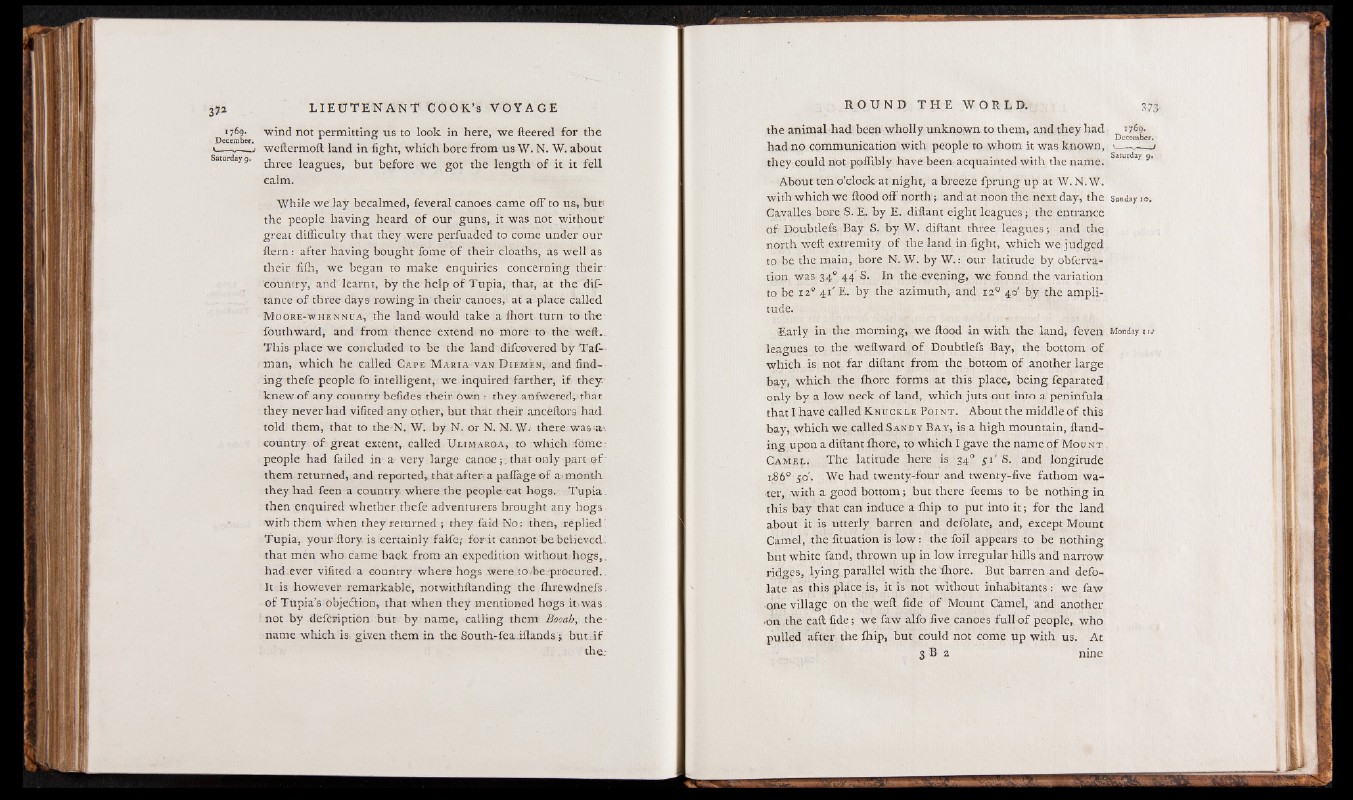
z n
1769. wind not permitting us to look in here, we fleered for the
,— j weftermoft land in fight, which bore from us W. N. W. about
Saturday 9. j j y g p leagues, but before we got the length of it it fell
calm.
While we lay becalmed, feveral canoes came off to us, but;
the people having heard of our guns, it was not without'
great difficulty that they were perfuaded to come under our
ftern: after having bought fome of their cloaths, as well as
their fiffi, we began to make enquiries concerning their
country, and learnt, by the help of Tupia, that, at the distance
of three days rowing in their canoes, at a place called
M o o r e -w h e n n u a , the land would take a ffiort turn to tire
fouthward, and from thence extend no more to the weft..
This place we concluded to be the land difcovered by Taf-
man, which he called C a p e M a r i a v a n D i e m e n , and finding
thefe people fo intelligent, we inquired farther, if they-
knewof any country befides their own t they anfwered, that
they never had vifited any other, but that their anceftors had
told them, that to the N. W. by N. or N. M. W. there was-a-,
country of great extent, called U i-im a r o a , to which fome:
people had failed in a very large canoethat only part of:
them returned,, and reported, that after a paffage o f a: month
they had feen a country where the people, eat hogs. Tupia.
then enquired whether thefe adventurers brought any hogs
with them when they returned ; they faid No: then, replied'
Tupia, your ftory is certainly fahe; forit cannot be believed.:
that men who came back from ah expedition without hogs,,
had.ever vifited a country where hogs were.tovbe.proeured..
It is however remarkable, notwithftanding the ffirewdnefs.
of Tupia’s: objection, that when they mentioned hogs it was,
not by defCsiption but by name, calling them Eooah, the-
name which is. given them in the South-fea.iflands ; butuf
the.-
the animal had been wholly unknown to them, and they had 1769-
December.
had no communication with people to whom it was known, j---------1
they could not poffibly have been acquainted with the name. Sa“ rday s'
About ten o’clock at night, a breeze fprung up at W. N. W.
with which we flood off north; and at noon the next day, the Sunday 10,
Cavalles bore S. E. by E. diflant eight leagues; the entrance
of Doubtlefs Bay S. by W. diflant three leagues; and the
north weft extremity of the land in fight, which we judged
to be the main, bore N. W. by W .: our latitude by obferva-
tion was 340 44' S. In the evening, we found the variation
to be 120 41' E. by the azimuth, and 120 40' by the amplitude.
Early in the morning, we flood in with the land, feven Monday 1 u
leagues to the weftward of Doubtlefs Bay, the bottom of
which is not far diflant from the bottom of another large
bay, which the ffiore forms at this place, being feparated
only by a low neck of land, which juts out into a peninfula
that Ihave called K n u c k l e P o i n t . About the middle of this
bay, which we called Sandy Ba y , is a high mountain, Handing
upon a diflant ffiore, to which I gave the name of M o u n t
C a m e l . The latitude here is 340 51' S. and longitude
1S60 50'. We had twenty-four and twenty-five fathom water,
with a good bottom; but there feems to be nothing in
this bay that can induce a ffiip to put into i t ; for the land
about it is utterly barren and defolate, and, except Mount
Camel, the fituation is low: the foil appears to be nothing
but white fand, thrown up in low irregular hills and narrow
ridges, lying parallel with the ffiore. But barren and defolate
as this place is, it is not without inhabitants: we faw
one village on the weft fide of Mount Camel, and another
on the eaft fide; we faw alfo five canoes full of people, who
pulled after the ffiip, but could not come up with us. At
3 B a nine